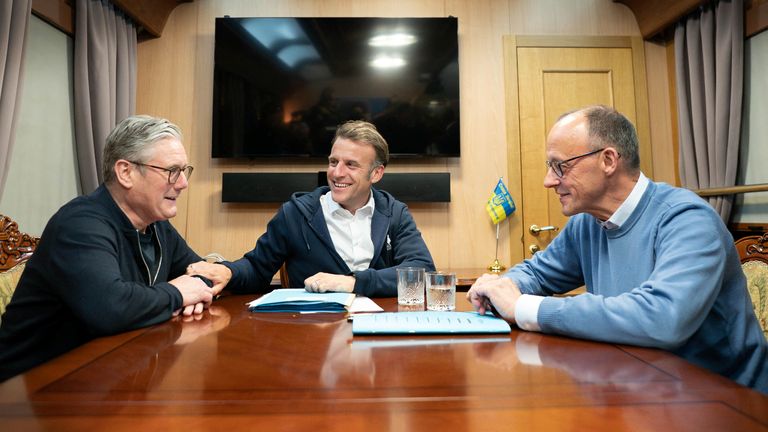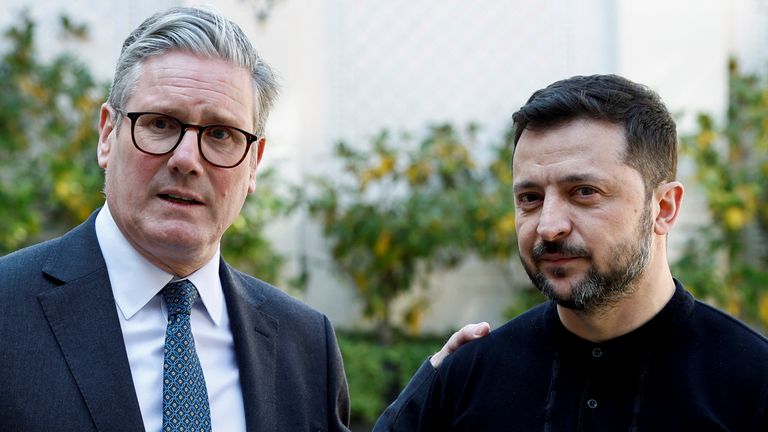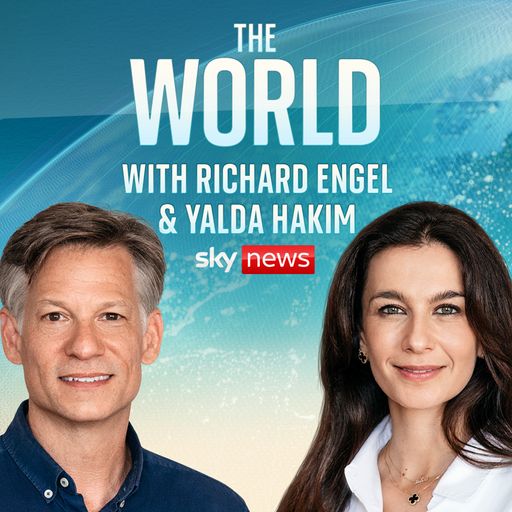Ukraine presses Russia for 30-day ceasefire as Starmer among leaders in Kyiv for talks


Sir Keir Starmer has joined other European leaders in Kyiv to press Russia to agree an unconditional 30-day ceasefire.
The prime minister is attending the summit alongside French President Emmanuel Macron, recently-elected German Chancellor Friedrich Merz and Polish Prime Minister Donald Tusk.
It is the first time the leaders of the four countries have travelled to Ukraine at the same time – arriving in the capital by train – with their meeting hosted by President Volodymyr Zelenskyy.

It comes after Donald Trump called for “ideally” a 30-day ceasefire between Kyiv and Moscow, and warned that if any pause in the fighting is not respected “the US and its partners will impose further sanctions”.
Security and defence analyst Michael Clarke told Sky News presenter Samantha Washington the European leaders are “rowing in behind” the US president, who referred to his “European allies” for the first time in this context in a post on his Truth Social platform.
“So this meeting is all about heaping pressure on the Russians to go along with the American proposal,” he said.
“It’s the closest the Europeans and the US have been for about three months on this issue.”


Ukraine’s foreign minister Andrii Sybiha said Ukraine and its allies are ready for a “full, unconditional ceasefire” for at least 30 days starting on Monday.
Ahead of the meeting on Saturday, Sir Keir, Mr Macron, Mr Tusk and Mr Merz released a joint statement.

International affairs editor
The hope is Russia’s unilateral ceasefire, such as it’s worth, can be extended for a month to give peace a chance.
But ahead of the meeting, Ukrainian sources told Sky News they are still waiting for President Donald Trump to put his full weight behind the idea.
The US leader has said a 30-day ceasefire would be ideal, but has shown no willingness yet for putting pressure on Russian president Vladimir Putin to agree.
The Russians say a ceasefire can only come after a peace deal can be reached.
European allies are still putting their hopes in a negotiated end to the war despite Moscow’s intransigence and President Trump’s apparent one-sided approach favouring Russia.
Ukrainians would prefer to be given enough economic and military support to secure victory.
But in over three years, despite its massive economic superiority to Russia and its access to more advanced military technology, Europe has not found the political will to give Kyiv the means to win.
Until they do, Vladimir Putin may decide it is still worth pursuing this war despite its massive cost in men and materiel on both sides.
“We reiterate our backing for President Trump’s calls for a peace deal and call on Russia to stop obstructing efforts to secure an enduring peace,” they said.
“Alongside the US, we call on Russia to agree a full and unconditional 30-day ceasefire to create the space for talks on a just and lasting peace.”

Please use Chrome browser for a more accessible video player

2:21
Putin’s Victory Day parade explained
The leaders said they were “ready to support peace talks as soon as possible”.
But they warned that they would continue to “ratchet up pressure on Russia’s war machine” until Moscow agrees to a lasting ceasefire.
“We are clear the bloodshed must end, Russia must stop its illegal invasion, and Ukraine must be able to prosper as a safe, secure and sovereign nation within its internationally recognised borders for generations to come,” their statement added.
“We will continue to increase our support for Ukraine.”
👉Listen to The World with Richard Engel and Yalda Hakim on your podcast app👈
Read more:
Russia’s VE Day parade felt like celebration of war
Michael Clarke Q&A on Ukraine war
Ukraine and Russia accuse each other of breaching ceasefire
The European leaders are set to visit the Maidan, a central square in Ukraine’s capital where flags represent those who died in the war.
They are also expected to host a virtual meeting for other leaders in the “coalition of the willing” to update them on progress towards a peacekeeping force.
Military officers from around 30 countries have been involved in drawing up plans for a coalition, which would provide a peacekeeping force in the event of a ceasefire being agreed between Russia and Ukraine.

Listen to The World with Richard Engel and Yalda Hakim every Wednesday
This force “would help regenerate Ukraine’s armed forces after any peace deal and strengthen confidence in any future peace”, according to Number 10.